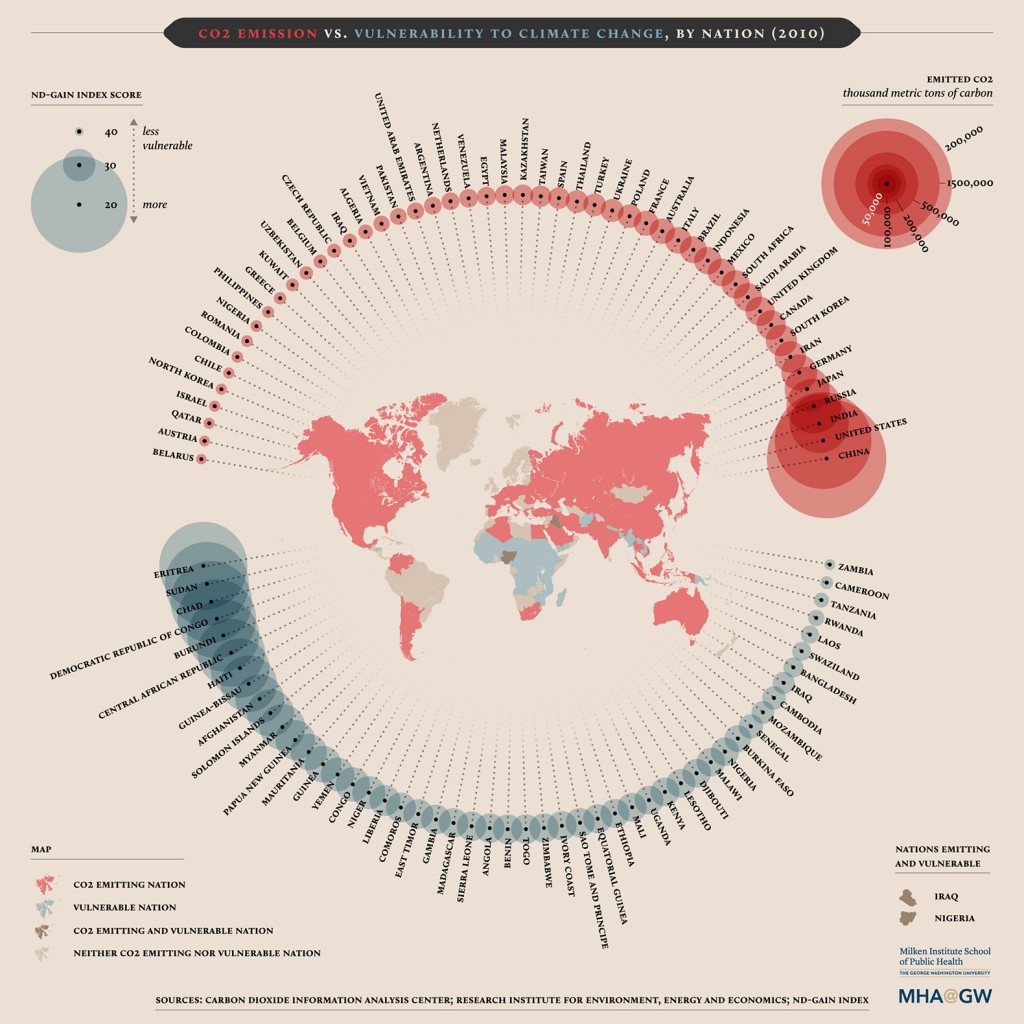
Which countries are causing global warming and which are most vulnerable to the effects
by Khalid Iqbal 10 November 2023
Presently, the challenge of climate change is one of the most critical global issues of our time. Its extensive repercussions are increasingly visible, affecting ecosystems, economies, and societies worldwide. While no nation remains impervious to its consequences, countries in the developing world, such as Pakistan, face particularly heightened vulnerabilities.
The change in our climate, instigated by human activities like fossil fuel combustion, deforestation, and industrial processes, is fundamentally altering Earth’s climate system. A surge in global temperatures, extreme weather events, rising sea levels, and ecosystem disruptions are just a few of the many effects. These impacts cut across national borders; however, developing nations bear a more substantial burden despite contributing minimally to greenhouse gas emissions.
The Intergovernmental Panel on Climate Change (IPCC) asserts that developing nations encounter heightened risks due to their limited adaptive capacity, less resilient infrastructure, and socio-economic vulnerabilities. It’s evident that those who have made the least contributions to climate change are often the most affected by its consequences.
Pakistan, situated in South Asia, is markedly prone to climate change’s effects due to its distinct geographical and environmental traits. The country grapples with various challenges induced by climate change, including melting Himalayan glaciers, erratic monsoon patterns, recurrent droughts, and severe floods.
In recent years, Pakistan has faced numerous climate-related calamities, significantly impacting lives and livelihoods. The catastrophic floods of 2010, among the worst tragedies in Pakistan’s history, affected over 20 million individuals and led to substantial economic losses. The agricultural sector, pivotal for the country’s food security and economy, has been severely affected by shifting precipitation patterns and rising temperatures.
The battle against climate change necessitates a unified global effort, with leading nations and major emitters taking the lead. The United States, China, the European Union, and other industrialized countries are responsible for accounting for a large share of global greenhouse gas emissions. International agreements such as the Paris Agreement lay the groundwork for collective action against climate change.
Nonetheless, the ethical obligation of these major powers extends beyond reducing emissions. It includes providing financial aid and technological assistance to vulnerable countries dealing with the aftermath of climate change.
The global community has initiated numerous climate aid initiatives and programs to assist developing nations. These endeavors aim to aid countries in reducing emissions, strengthening resilience, and transitioning towards sustainable development pathways. For instance, the Green Climate Fund mobilizes resources for climate projects in developing countries, while initiatives like the World Bank’s Climate Investment Funds are in place. However, these initiatives confront obstacles such as insufficient funding, complex administrative procedures, and bureaucratic delays. Moreover, their reach often falls short of addressing the immediate needs of vulnerable nations.
Major global powers must significantly elevate their efforts to combat climate change and support the most affected nations effectively. This includes augmenting financial aid, facilitating technology transfer, and promoting capacity-building to enable developing nations to withstand and mitigate the effects of climate change. Financial assistance is particularly crucial for countries like Pakistan, where climate-induced disasters strain already scarce resources. Investments in sustainable infrastructure, renewable energy, and climate-resilient agriculture can substantially bolster a nation’s capacity to manage climate change.
Furthermore, policy shifts and the adoption of sustainable practices within major economies are indispensable. The transition towards cleaner energy sources, enforcing stricter emission controls, and incentivizing green technologies are essential measures that major emitters must take to reduce their carbon footprint. Collaborative efforts, knowledge sharing, and technology transfer between nations are indispensable to a successful global response.
Pakistan has acknowledged the seriousness of the climate crisis and initiated steps to tackle it. The country’s Climate Change Policy outlines strategies for adaptation and mitigation, encompassing afforestation projects, the expansion of renewable energy, and measures for disaster preparedness. Collaborative platforms like the Climate Adaptation Summit provide opportunities for Pakistan to seek support for its climate initiatives. However, Pakistan’s ability to confront climate change is constrained without substantial assistance from major global powers. Enhanced cooperation and support from these nations can magnify Pakistan’s efforts and contribute to a more sustainable and resilient future for the country.
The adverse repercussions of climate change form an urgent global crisis that necessitates collective action. Major global powers responsible for a significant share of emissions are morally obligated to aid the most affected nations, including Pakistan. Financial aid, technology transfer, and policy modifications within these nations are pivotal in supporting vulnerable countries in their fight against climate change. Global unity and collaboration are essential in addressing the comprehensive climate crisis. The time to act is now. Major powers must acknowledge their central role in securing a sustainable future for all and take decisive steps to meet their moral commitment. Only through unified efforts can the world mitigate the adverse effects of climate change and build a more resilient and equitable world for future generations.
